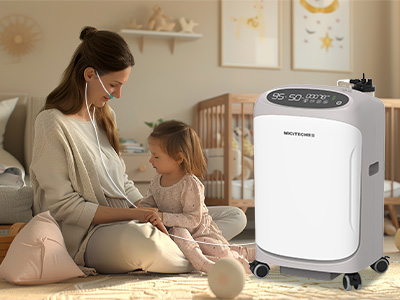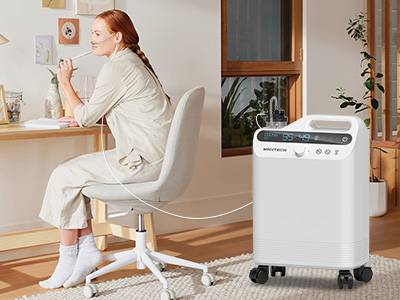15 Nov 2024
Oxygen concentratorand nebulizer machines are two crucial devices in respiratory care, each serving a unique purpose. While both are often found in homes of individuals with respiratory conditions, their functions differ significantly. Understanding these differences is essential for patients, caregivers, and medical practitioners who aim to provide the best respiratory support. Knowing which device to use and when can make a profound impact on overall health and quality of life.

What is an Oxygen Concentrator?
An oxygen concentrator is a medical device designed to deliver a steady supply of oxygen to individuals with low blood oxygen levels. It operates by taking in air from the surroundings, filtering out nitrogen, and delivering concentrated oxygen to the patient. This device is primarily used for conditions like chronic obstructive pulmonary disease (COPD), pulmonary fibrosis, and severe asthma, where maintaining an adequate oxygen level is critical. Oxygen concentrators are often prescribed for long-term use, allowing patients to sustain their oxygen levels effectively without relying on oxygen cylinders.
What is a Nebulizer Machine?
A nebulizer, on the other hand, is a device that converts liquid medication into a fine mist, allowing it to be inhaled directly into the lungs. This method of delivery is especially useful for individuals with asthma, bronchitis, and other respiratory conditions that benefit from direct lung-targeted treatments. Nebulizers are commonly used to administer medications such as bronchodilators, steroids, and antibiotics. By delivering medication as a mist, nebulizers allow faster absorption and targeted action, making them invaluable in managing acute respiratory symptoms.

Key Differences Between Oxygen Concentrators and Nebulizers
The primary distinction between oxygen concentrators and nebulizers lies in their purpose. Oxygen concentrators are designed to provide supplemental oxygen to individuals whose respiratory function is compromised, while nebulizers are used to deliver specific medications directly to the lungs. In terms of delivery, oxygen concentrators provide a continuous flow of oxygen through a nasal cannula or mask. Nebulizers, however, release medication in mist form through a mouthpiece or mask, which the patient inhales over several minutes.
Benefits and Limitations of Oxygen Concentrators
Oxygen concentrators come with several advantages. One significant benefit is their ability to provide a continuous, steady flow of oxygen, which is essential for patients who need constant support. Additionally, concentrators eliminate the need for bulky oxygen tanks, making long-term oxygen therapy more accessible and convenient. However, there are limitations. Many oxygen concentrators are not easily portable, particularly the larger, home-based models. They also require a reliable power source, which can be a concern in areas prone to power outages.
Benefits and Limitations of Nebulizers
Nebulizers provide a unique advantage in respiratory care, particularly for patients requiring medication that must be inhaled directly into the lungs. This is especially helpful for young children and individuals who struggle to use inhalers correctly. Nebulizers allow medication to be delivered in a steady, controlled manner. However, they are not without drawbacks. Nebulizers can be noisy, and the process of medication delivery typically takes longer than using an inhaler. Additionally, preparation of the nebulizer for each session can be time-consuming, as it involves measuring medication and ensuring the device is properly assembled.
Choosing the Right Device for Respiratory Needs
Selecting between an oxygen concentrator and a nebulizer depends largely on the individual's medical needs. For those needing constant oxygen supplementation, an oxygen concentrator is the ideal choice. However, if the goal is to administer medication directly to the lungs, particularly for conditions like asthma or acute bronchitis, a nebulizer is more appropriate. In some cases, healthcare providers may recommend both devices for individuals with complex respiratory needs. Consulting a physician is essential in making an informed decision, as they can provide personalized guidance based on medical history and current health status.
Using Both Devices Together
In some cases, patients may benefit from using both an oxygen concentrator and a nebulizer simultaneously. For instance, individuals with severe COPD or advanced lung disease might require both supplemental oxygen and medication. In such situations, the nebulizer can be used to deliver the medication, and the oxygen concentrator ensures that the patient maintains adequate oxygen levels throughout the process. This combined approach can provide a comprehensive respiratory treatment, helping manage symptoms more effectively.
Maintenance and Care for Oxygen Concentrators and Nebulizers
Proper maintenance is crucial for both oxygen concentrators and nebulizers to ensure they function correctly. Oxygen concentrators require regular filter cleaning, tubing replacement, and periodic checks to verify that oxygen output remains at the correct level. Nebulizers, meanwhile, require diligent cleaning after each use to prevent bacterial buildup in the medication chamber and tubing. Cleaning involves rinsing the components with warm water, drying them thoroughly, and occasionally disinfecting them to maintain hygiene. Regular maintenance helps prolong the life of the devices and ensures they deliver optimal respiratory support.
Conclusion: Understanding the Distinct Roles of Each Device
Oxygen concentrators and nebulizers each play a vital role in respiratory care, serving different but complementary purposes. While oxygen concentrators provide essential oxygen support for those with chronic low oxygen levels, nebulizers are invaluable for delivering lung-targeted medication. For individuals with complex respiratory needs, understanding the unique benefits and limitations of each device can empower them to manage their health more effectively. Consulting healthcare professionals remains essential in choosing the right equipment, ensuring that each patient receives the most appropriate and effective respiratory care.
Keywords: oxygen concentrator
Originally published 15 Nov 2024, updated 15 Nov 2024.